We rather be ruined than changed.
We rather die in our dread,
than climb the cross of the moment,
and let our illusions
die.
-W.H. Auden, excerpted from “The Age of Anxiety”
Not long ago we strolled along a beautiful white-sand beach in Orange Beach, Alabama, taking photos of freshly washed ashore black and brown tar balls. We watched little boys playing in the shallow surf, trying to catch minnows, as red oil boom bobbed in the waves just offshore behind them. This is the world we have all created.
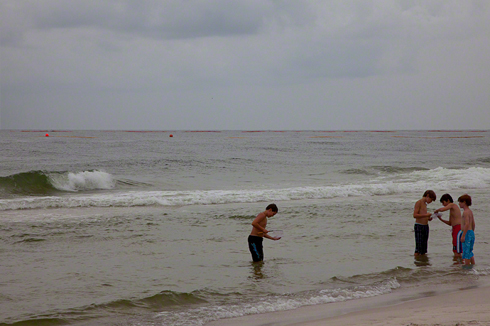
Photo by Erika Blumenfeld © 2010

Photo by Erika Blumenfeld © 2010
Above all of this, an oil-spotting white blimp made slow rumbling passes up and down the beach.
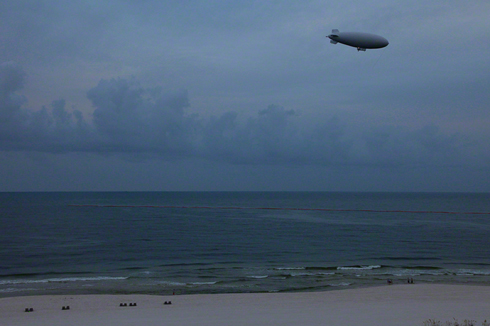
Photo by Erika Blumenfeld © 2010
Across the street from our hotel, a BP gas station had crudely been transformed into a Shell station, as if trading out one big oil company for another makes any difference to the Gulf of Mexico, to humans needing clean eco-systems, or to the Earth. As though changing the face of a gas dispensing station relieves any of us the burden of complicity in our oil-based economy and infrastructure that is burning up the planet.

Photo by Erika Blumenfeld © 2010
I wrote this whilst watching shrimp-boats, tugboats, and barges related to the oil response move around out in the Gulf, beyond the booming that continues to appear to do little else than stand as a symbol to the impotency of the response effort to the ongoing catastrophe wracking the Gulf.
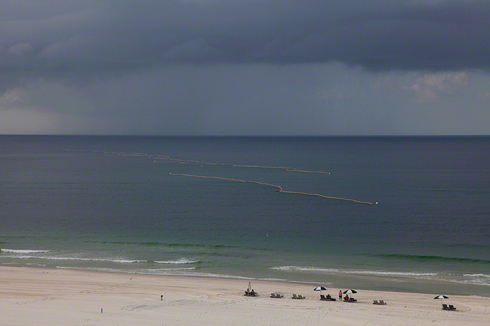
Photo by Erika Blumenfeld © 2010
All of these scenes leave me taken aback by the oil catastrophe, the vile wedding of the federal government and corporations like BP which enabled this debacle that has already destroyed thousands of lives, untold numbers of deaths of Gulf marine and bird life, and such deep damage to the Gulf ecosystem.
While reporting from the Gulf region this last month, I’ve learned that 97 percent of the commercial catch of Gulf fish species depends on the shore estuaries as nursery habitats for their survival. Gulf shrimp larvae, for example, live in the estuaries, now much of which are laden with oil and dispersant, where they grow up before heading back into open water as adults. In addition, oyster reefs, like coral reefs, hold the coastal ecosystem together by forming a breakwater that protects marsh shorelines from erosion and storms, are in great jeopardy from dispersed oil. Gulf oyster reefs are the best in the world, yet even before BP’s oil disaster, between 50-90 percent of the Gulf’s oyster reefs were already lost.
Even as far away from “the source” as we were in Orange Beach, Alabama, tar balls littered the beach.

Photo by Erika Blumenfeld © 2010
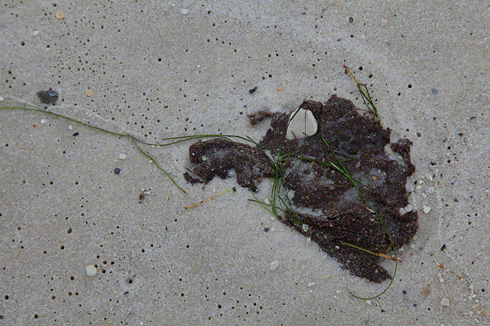
Photo by Erika Blumenfeld © 2010
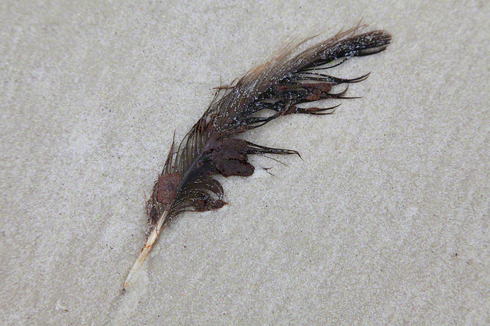
Photo by Erika Blumenfeld © 2010
This week, in the wake of BP’s announcement to replace their CEO, we appear to be amidst a propaganda blitz of news stories portraying the disaster as not as bad as many feared. Along with most of the media going along with BP’s assertion that the relief wells upcoming bid to plug the Macondo well as practically a guaranteed success, other reportage is working in BP’s favor. This, along with BP’s second-quarter report that shows revenues of $75.9 billion (This total includes a $32.2 billion write-down, and the $20 billion so-called compensation fund) that even beat Wall Street’s estimates, is so much good news for BP! And their good news continues, if you pay attention to much of the media this week.
Do you like this? Click here to get Truthout stories sent to your inbox every day – free.
A Reuters story titled, “Special Report: Watching grass grow in the Gulf, and cheering!” tells of Irv Mendelssohn, a wetland ecologist who, speaking of Louisiana’s damaged marsh wetlands, offers a “cautiously optimistic prognosis for their recovery.”
“There was a lot of fear before any data was gathered that this could be really damaging to coastal wetlands,” Mendelssohn reported to Reuters, “As it turned out, we actually didn’t see much oil. In fact, we didn’t see any oil on the water’s surface in the bays.”
His extensive research for making this comment? A four-hour boat tour out of Venice, Louisiana with two of his colleagues to visit two sites.
Let us also remember that LSU, where Mendelssohn works as a professor, is one of several Gulf region education institutions that is receiving millions of dollars in funding from BP. BP, in what it calls the Gulf of Mexico Research Initiative, is providing the bulk of the funding to be used to study the effects of the oil disaster, and has promised 500 million dollars for research and restoration projects. It would be intellectually dishonest for anyone to think BP is not spending this money for its own benefit.
Doug Inkley, a senior scientist at the National Wildlife Federation, was also quoted in the piece. Inkley said it is too soon to tell what the BP spill’s impact will be on the Gulf ecosystem, which ranges from deep-diving sperm whales to Whale Sharks to endangered Kemp’s Ridley sea turtles to centuries-old coral reefs to the tiny phytoplankton at the bottom of the Gulf food web. “Nobody really knows what’s happening so far underwater, and it’s a complex system,” Inkley said. “You don’t know which part of it you can knock out and not have a huge effect.”
Even Mendelssohn expressed concern: “We know there’s a lot that’s been spilled, an estimate of 40,000 to 60,000 barrels a day. And we don’t know exactly where all that is. So if because of a hurricane or storms or high water, some of this oil that maybe has not degraded too much gets pushed into wetlands … there could be some serious effects, and the plants may be either stressed or killed by that.”
Nevertheless, Reuters, in a move that certainly assisted BP’s PR full-court-press, preferred to run with the cheery headline, “Watching grass grow in the Gulf, and cheering!”
Then we had this ditty from Yahoo news: “Mighty oil-eating microbes help clean up the Gulf.” The story leads with this:
Where is all the oil? Nearly two weeks after BP finally capped the biggest oil spill in U.S. history, the oil slicks that once spread across thousands of miles of the Gulf of Mexico have largely disappeared. Nor has much oil washed up on the sandy beaches and marshes along the Louisiana coast. And the small cleanup army in the Gulf has only managed to skim up a tiny fraction of the millions of gallons of oil spilled in the 100 days since the Deepwater Horizon rig went up in flames.
After telling of evaporation and oil-eating microbes saving the day, the story concludes with, “It is still far too early to know how much damage the spill has done — and may still be doing — to the environment. Tar balls continue to wash up on beaches. And the risk of a leak remains, until the well is permanently capped sometime in the next few weeks.” But, like the aforementioned piece by Reuters, the reader is left with a cheery assessment of how this disaster is not going to be so bad after all.
Out of sight, out of mind.
Far less available to the average news consumer are stories about the growing dead zone off the Alabama coast that is linked to BP’s disaster. Nor are most folks alerted to the fact that experts estimate that between 40-60 percent of Louisiana’s wetlands loss can already be attributed to the oil and gas industries activities over the decades, and said industry has added an average of more than 238,000 gallons of oil to the Gulf of Mexico each year for the last ten years.
Recently I spoke with Dr. Ed Cake, a Biological Oceanographer and Marine and Oyster Biologist. Dr. Cake is one of many Gulf region scientists who holds deep concern for the long-term impact of this disaster.
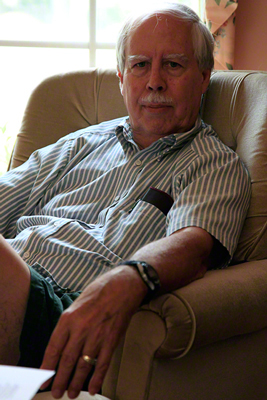
Photo by Erika Blumenfeld © 2010
“Just as the floating tar balls and patties represent the tip of BP’s oilberg in the Gulf of Mexico, the initial damages to the finfish and shellfish suffered to date represent only the “tip” of the long-term damages to those organisms and their habitats,” he explained, “In my opinion and based on a review of studies from previous oil spills in Mexico (Ixtoc-1), Alaska (Exxon Valdez), and France (Amoco Cadiz), I must conclude that the adverse impacts of the dispersed and submerged oil from the Deepwater Horizon gusher will continue for decades into the future in Alabama, Mississippi, and Louisiana.”
This bleak but honest assessment is compounded by another made by EPA whistleblower Hugh Kaufman. I shared a segment on Democracy Now! last week with Kaufman, who said this of the dispersants BP is using: “… Consequently, we have people, wildlife—we have dolphins that are hemorrhaging. People who work near it are hemorrhaging internally. And that’s what dispersants are supposed to do. EPA now is taking the position that they really don’t know how dangerous it is, even though if you read the label, it tells you how dangerous it is. And, for example, in the Exxon Valdez case, people who worked with dispersants, most of them are dead now. The average death age is around fifty. It’s very dangerous, and it’s an economic—it’s an economic protector of BP, not an environmental protector of the public.”
Also not getting quite the attention as the more “hopeful” stories is the fact that the Gulf of Mexico has 27,000 abandoned wells, each of which a leaking time bomb. 27,000 oil and gas wells that have been ignored for decades, and nobody in government or industry is checking to see if they are leaking or not. 3,500 of these wells are currently classified in federal government records as “temporarily abandoned,” a classification that doesn’t exactly instill faith in their being safe for the environment.
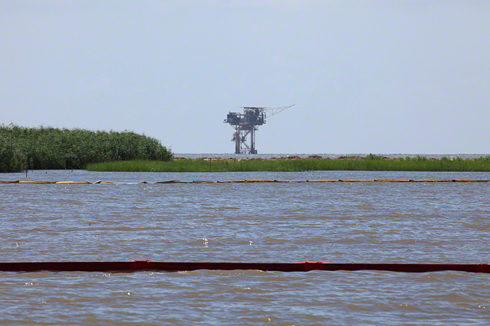
Photo by Erika Blumenfeld © 2010
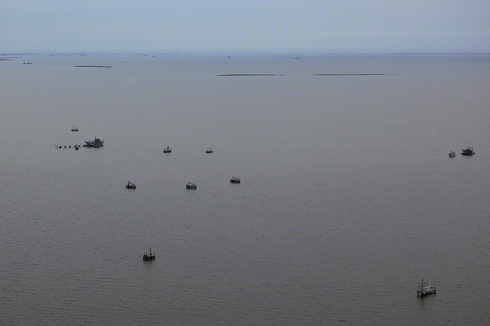
Photo by Erika Blumenfeld © 2010
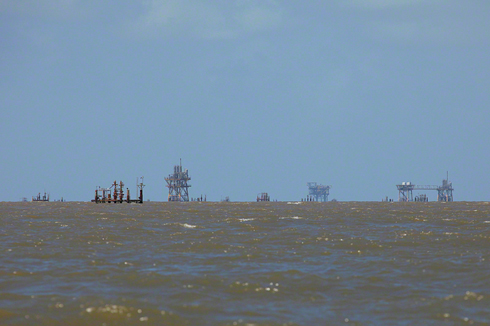
Photo by Erika Blumenfeld © 2010
We’ve seen many of these wells, although untold numbers are hidden beneath the water. I marvel at the fact that the BP oil disaster has, as its backdrop, thousands of other wells that could also, one day, become more environmental disasters.
In fact, some already are. On Tuesday, July 27, near Louisiana’s Barataria Bay area an oil platform that was abandoned in 2008 was struck by a tugboat and was spewing oil and gas 20 feet into the air. The next day, the area, already one of the most heavily afflicted by BP’s oil disaster, saw the plume of oil and gas reach 100 feet into the air, and a mile-long oil slick smeared the surface of the water. This incident is at least the third that has occurred in the Gulf since the BP disaster began on April 20.
Meanwhile, BP continues to find new and not-so-creative ways to deflect responsibility for its disaster. As of a few days ago, BP had yet to put any money into the promised $20 billion compensation escrow account.
In addition to this, on July 27, BP announced its plans to offset the entire cost of its Gulf of Mexico oil disaster against its tax bill, a tax credit that then is paid for by US taxpayers by the reduction of future contributions to US tax coffers from BP.
It all continues forward. Our complicit dependence on our oil-based economy is killing us. Global climate change, a direct result of this addiction, has 2010 on track as the hottest year ever recorded. We cannot point the finger at BP, or Exxon, or the US government, or anyone else participating in the destruction and annihilation of life on the planet without looking in the mirror. Each of us plays a part in this.
While we are most certainly obliged to do what we must to hold those responsible to account, our primary obligation lies in holding ourselves accountable. In doing so, may all our illusions die.
This is the contradiction and hypocrisy we all must struggle with daily. There are no simple answers. I can no longer ask myself, “What can I do,” but rather, “What must I do?”
Thank you for reading Truthout. Before you go…
…We ask that you take just a second to read this message.
We are up against a far-reaching, wide-scale attack on press freedom coming from the Trump administration. Since his inauguration last year, we’ve seen frightening censorship, a right-wing takeover of the news industry, and worsening financial conditions for progressive nonprofits across the board.
We can only resist Trump’s agenda by cultivating a strong base of support. The right-wing mediasphere is funded comfortably by billionaire owners and venture capitalist philanthropists. At Truthout, we have you.
We need your help to sustain the fight against authoritarianism in 2026. Please take a meaningful action in this fight: make a one-time or monthly donation to Truthout. If you have the means, please dig deep.
